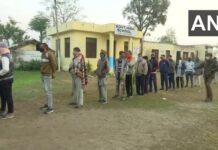SOURCE: ET
A recent study conducted jointly by Professor Dheeraj Sharma, director of the Indian Institute of Management, Rohtak and Professor Farah Arif, of the Lahore University of Management Sciences, Pakistan has revealed interesting facts about life in Jammu & Kashmir and Pakistan Occupied Kashmir.
As part of their research, they surveyed a random sample of 1,425 individuals across Pakistan Occupied Kashmir (POK) and Gilgit-Baltistan under Pakistani administration, and Ladakh and Jammu & Kashmir in India. With both countries having predominantly young populations, the survey focused largely on those in their twenties and thirties – the generation which will shape the future of these regions.
Participants were asked about how satisfied they were with their lives, and whether they believed they were better off than their parent’s generation. In addition, the study aimed to assess whether the respondents were happy in their homeland, or intended to leave for better pastures in the future. The respondents were also questioned to understand their attitude to their government, and whether their expectations in terms of education, infrastructure and healthcare were met.
A whopping four out of five people in both the Ladakh and Jammu regions, and nearly seven in every ten in Kashmir stated they were happy with their lives, and believed life was better than it had been in their parents’ generation. Nearly three in four people were pleased with the governance of their region, particularly the educational institutions, healthcare facilities, infrastructure development and employment opportunities available to them. Barely one-fourth in the first two locations, and one-third in the third location claimed to have any intention of possibly leaving their homeland for other locations.
In Pakistan, on the other hand, every second person in Pakistan Occupied Kashmir (POK), and four out of every five persons in Gilgit Baltistan reported that they were not satisfied with their lives. Almost the same number stated that life had been better in their parents’ generation, and had deteriorated since. More than half the people in Pakistan Occupied Kashmir were not happy with their government.
In Gilgit-Baltistan, this was even higher – seven in every ten were unhappy with their government here. These respondents had the negative answer regarding their satisfaction with the education, healthcare, employment and infrastructure in their regions. Perhaps not surprisingly, over half the people unhesitatingly stated that they intended to move out of their homeland, in search of a better life for themselves and their children. There is a scarcity of employment opportunities and worsening living conditions compared to the previous generation.





